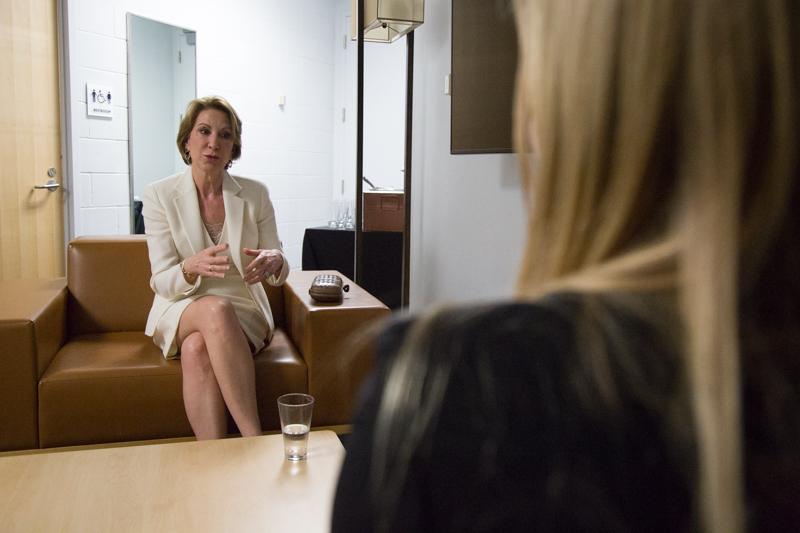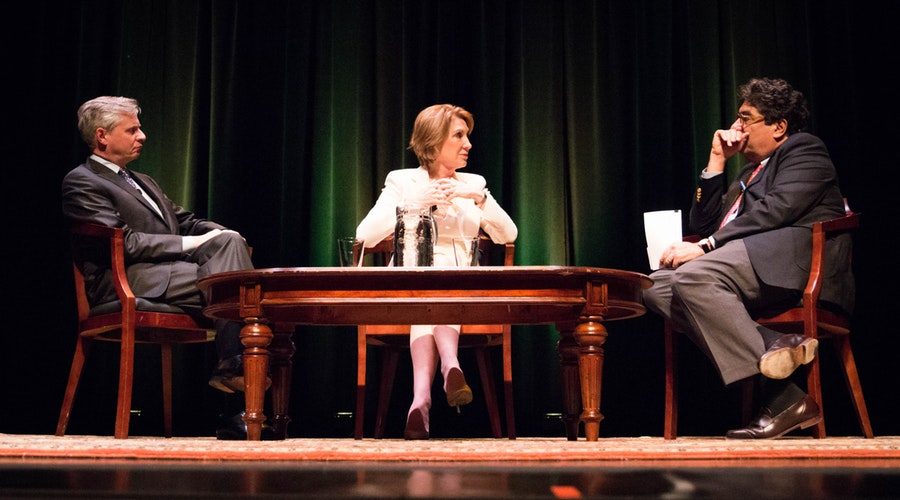Q&A with Carly Fiorina, former Hewlett-Packard CEO
Former Hewlett-Packard CEO and Repiblican Presidential Candidate Carly Fiorina speaks to the Vanderbilt Hustler before the Chancellor’s Lecture Series on Tuesday, February 20, 2018. (Photo by Claire Barnett)
On Feb. 20, Carly Fiorina joined Chancellor Nicholas Zeppos and visiting professor of political science Jon Meacham for a conversation centered around leadership, entitled “Redefining Leadership: Crafting Civic Virtues in America.” Fiorina is primarily known for her tenure as CEO of Hewlett Packard from 1999-2005, where she was the first female CEO of a Fortune 50 company and oversaw what was at the time the largest technology merger in history. She later went on to run for the 2016 Republican presidential nomination and, after suspending her own campaign, served as Ted Cruz’s running mate for a week before he too suspended his run. In recent years, she has used her experience to train other leaders through the Unlocking Potential Foundation, of which she is chairman. The Hustler had the opportunity to sit down with Ms. Fiorina prior to her talk at the university.
VH: You have had experience in for profit, the public sector and now nonprofits– what have you learned across all three?
CF: One big takeaway is that people are people, wherever you find them, and so the challenges of problem solving and the challenges of leadership are always the same. The context is different. So the context of government is different of the context of a nonprofit is different than the context of a big technology company, but people are the same. The fundamentals of how you collaborate with people, especially those that are different than you are, are always the same. Effective collaboration always takes humility and empathy, whether it’s the public sector, the private sector, nonprofit or for profit. Another big takeaway is that bureaucracies are always a problem. In business they’re a problem, in government they’re a problem, because what bureaucracies are is a concentration of power, a process intensive organization that gets focused on self preservation, as opposed to problem solving. And I guess the final big takeaway I would say, as it relates to problem solving, which is the purpose of leadership. In the end, the people closest to the problem understand best how to solve it.
VH: I’d love to hear more about what you thought during your campaign about bringing your outsider perspective both as a businesswoman and as a woman on a stage of fifteen men. What was that experience like?
CF: In a way, I think me being on the debate stage with fifteen men was less a new experience for me and more a new experience for them, because I’ve spent virtually all of my career around mostly men and competing with mostly men. So being on a stage with mostly men and having to get my point across when that is sometimes difficult because they’re doing all the talking, that wasn’t new. I think it was new for them. I ran, because I think ours was intended to be a citizen government, and I think we have way too many professional politicians and I think politics has become a game of winning instead of about problem solving and leadership. I also ran because I think, while business and government are different, there are things about business that government could learn from. For example, business focuses on results. There isn’t much focus on results in politics, other than winning. It’s about words, it’s about speeches, it’s about votes, it’s about raising money, but it’s not all that often about what results are we producing and what can be sustained over time. Finally, I know a lot about big bureaucracies and I think if we’re ever going to tame Washington, it will be by actually tackling the bureaucracy of Washington. And that’s not a partisan comment, because Republicans and Democrats alike have been captured by, stymied by and ultimately defeated by the bureaucracy of Washington.

VH: Do your experiences as a woman breaking glass ceilings impact the way that you reach other community leaders through your foundation and through your work? Do you draw on that experience regularly?
CF: That’s such a great question. Yes, they do impact it, and I do draw on that experience. So the thing that I have experienced over and over again, whether it was starting as a secretary and being underestimated or overlooked, over and over and over, to the modern day, the current day, is that people who have so much to offer are so frequently overlooked and underestimated. And so I try never to overlook or underestimate someone, particularly based on how they look. I think women are, women have come a very very long way, but women are not granted the presumption of competence. They have to prove it. Men are frequently offered the presumption of competence. And in a way, that requirement to prove it over and over again has become a blessing to me, because it’s gotten me focused on results. And so I try and remember those two things all the time: don’t overlook someone, don’t underestimate someone based on their looks or circumstances or appearance, and in the end, it’s about producing results and solving problems and actually making a difference.
VH: I read your piece for Medium about workplace harassment, and I want to hear more about what you think in light of this large #metoo movement and the ongoing push for women to speak out. Did you experience these things coming up and did you think there would be the kind of change and movement that there is now?
CF: So yes, I experienced those things and I think most women have. I don’t mean, thankfully I’ve not been assaulted, but I’ve certainly been groped, you know all the things that you can imagine that people talk about have happened to me. I think it’s important to define what abuse, harassment, assault are. They’re an abuse of power. Sex is the weapon, but it’s about abuse of power. And the reason that women are more frequently subjected to this is because they are more frequently powerless. Of course, young men and young boys have been assaulted and abused, and once again it is an abuse of power. The power that’s being abused, perhaps the power is physical supremacy, perhaps the power is trust, perhaps the power is position of authority, but in all cases, someone is abusing their power and using sex as a weapon, and they’re doing so to dismiss someone, disparage someone, demean someone. In the 21st century, we should realize that the only limitless resource we have, and what we need more of not less of to solve the very fundamental, complex problems that face us, is human potential. And the abuse of power crushes human potential. Women are half the talent. So on top of that abuse of power being wrong, and it is wrong, it’s stupid. When institutions demean or dismiss half their talent, it’s self defeating. And that’s why I said in that op-ed that yes, it’s great that women are speaking up. But in the end, men have to decide. Men have to decide that they’re not going to respect anymore a man that abuses his power. Men have to decide that it’s not really okay to dismiss and demean just because they look different or perhaps look less powerful. In the end, we all have to decide.
VH: Obviously our president has accusations against him and we have a lot of leaders in Congress who have accusations, so how do we as a society make those decisions when our leadership is often the one abusing the power?
CF: It’s a really good question. And I think it is one of the reasons why young people are so confused about leadership, because if you have people in positions of power who claim to be leaders who are not leading, who are abusing their power, we all need to decide that that’s not something to emulate, and we perhaps should not put people like that in positions of power. And that will require I think all of us to decide that character actually matters. That character matters maybe more than partisan politics, that character matters more than position. Character is such an old fashioned word. We don’t celebrate character very much in our culture anymore. What do we celebrate? We celebrate outrageous behavior, we celebrate conflict, we celebrate controversy. Wow, pornography is everywhere, what signal does that send? I think maybe we need to step back, people of all ages, men and women, and say what is it we should lift up. Maybe, we should lift up character and values and how somebody behaves. Because we’re not right now.
VH: Thinking of big problems, a huge conversation right now is, of course in light of last week’s tragedy, around gun control. Do you have any thoughts on how we come together as a country and really look at an issue that is as widespread as this?
CF: So first I would say that, when you look at a problem, you have to look at it in its totality. The politics turn it into a discussion of gun control like that. And there’s no question that guns are part of this problem. But we also ought to be having a conversation at the same time about why is it that literally every institution failed in this case. I mean, if you read the story of this young man, every institution, every safety net failed. Social services, mental health professionals, local police, the school officials- this kid was, everything was going wrong with him. There was warning sign after warning sign after warning sign. And so we’d better look at all of that. I think there’s a lot we can agree on. What we may be able to do to solve the problem is if citizens, not politicians, say can we talk about what we agree on. He shouldn’t have been able to buy a gun, why did everybody fail this kids, why were so many warning signs missed? The FBI missed a warning sign for sure, but so did everybody else. Why is that? We better look at all of that, and not just immediately go to the political argument of gun control. Not that it’s not part of the solution, it is, but understand that both sides of that political spectrum are raising money right now on this issue, and that’s not solving the problem either.


Sam Zern ('20) has been a member of The Vanderbilt Hustler since her freshman year, first as a staff writer and shortly after as assistant campus editor. She went on to be campus editor and, later, editor in chief. In her senior year at Vanderbilt, Sam was managing editor and streamlined recruitment and training processes.
In her time as a member of the editorial board, she has prioritized diversity and breadth in coverage, wanting to make sure as much of Vanderbilt as possible is represented in...


